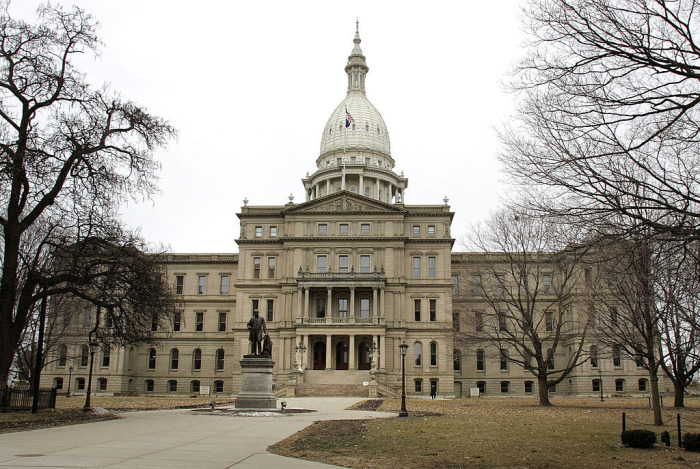Michigan judge's reversal of criminal abortion law is 'Roe 2.0'

A Michigan judge has declared a 1931 state law banning most abortions unconstitutional, months after the U.S. Supreme Court overturned Roe v. Wade, the 1973 decision that legalized abortion nationwide.
In a Wednesday ruling, Michigan Court of Claims Judge Elizabeth Gleicher issued a permanent injunction barring enforcement of the ban by the state’s Attorney General and county prosecutors.
The law, which had been dormant before the Supreme Court returned the abortion issue to the states in Dobbs v. Jackson Women’s Health Organization, makes it a crime to commit abortions unless the mother’s life is at risk in a medical emergency.
Gleicher ruled that the law “compels motherhood” and “deprives only women of their ability to thrive as contributing participating in world outside the home and as parents of wanted children.”
"Manifestly, criminalizing abortion will eliminate access to a mainstay healthcare service. For 50 years, Michiganders have freely exercised the right to safely control their health and their reproductive destinies by deciding when and whether to carry a pregnancy to term," Gleicher wrote in the opinion, in part, according to the Detroit Free Press.
Alexandra Snyder, CEO of Life Legal Defense Foundation, a pro-life nonprofit law firm, said in an interview with The Christian Post that Gleicher’s ruling was “Roe 2.0 for Michigan.”
“Her arguments about the right to privacy, the right to bodily integrity, and then calling pregnancy a bodily intrusion just reveals her own bias toward abortion and against children,” he said.
Snyder also found it ironic that the provision of Michigan’s Constitution that Gleicher relied upon in her ruling states: “No person shall be compelled in any criminal case to be a witness against himself, nor be deprived of life, liberty or property, without due process of law.”
“And the Supreme Court has already said, in terms of the U.S. Constitution, that there is no liberty interest under the 14th Amendment that would grant the right to abortion,” Snyder said.
He further noted that Gleicher is a Planned Parenthood donor. The judge’s potential conflict of interest was cited in a complaint filed by multiple pro-life groups, including the Alliance Defending Freedom and Right to Life Michigan, requesting that Gleicher recuse herself from the case.
The complaint further added that Gleicher received an “advocate award” from Planned Parenthood and had represented them in a previous lawsuit.
As The National Review reported in May, Gleicher refused to recuse herself from the case.
Gleicher’s decision states that criminalizing all abortions, barring those performed to safeguard the mother's health, violates the bodily integrity and right to equal protection afforded to pregnant individuals under the Michigan constitution.
In contrast to the Supreme Court’s ruling in June, stating that the U.S. Constitution does not confer a right to abortion, the Michigan judge determined there was enough evidence to conclude that her state’s constitution bestows protections on those seeking to terminate a pregnancy.
“Our Constitution does not permit the Legislature to impose unjustifiable burdens on different classes of pregnant women,” she wrote.
“It also forbids treating pregnant women as unequal to men in terms of their ability to make personal decisions about when and whether to be a parent.”
According to the Detroit Free Press, the order is not final, as opponents can still appeal to a higher court. However, it is the first time that a Michigan judge has weighed in on the constitutionality of abortion in the absence of Roe.
The recent ruling comes in response to a lawsuit filed against Michigan Attorney General Dana Nessel by Planned Parenthood of Michigan and Michigan abortionist Sarah Wallett in April. The lawsuit argued that the law was unconstitutionally vague and violated Michganders’ rights under the state constitution and civil laws.
On May 17, the Court of Claims granted a preliminary injunction temporarily blocking the ban and upheld abortion access in the state after the Supreme Court reversed Roe the following month.
Michigan Gov. Gretchen Whitmer, according to the Detroit Free Press, thanked Gleicher for her recent ruling, although she noted it was likely to be contested.
“We know that there’s a group of extremists who will stop at nothing to ban abortion even in cases of rape and incest. With our rights still hanging by a thread, the Michigan Supreme Court needs to provide certainty and rule on my lawsuit to protect the right to abortion in the state constitution," Whitmer said in a statement.
“While other states — and even some politicians in Lansing — take steps to control women’s bodies by defending extreme restrictions on abortion and health care, I will fight like hell for reproductive freedom."
The Guttmacher Institute, Planned Parenthood’s former research arm, noted that 13 states have “trigger laws” on the books that banned abortion after Roe’s reversal: Arkansas, Idaho, Kentucky, Louisiana, Mississippi, Missouri, North Dakota, Oklahoma, South Dakota, Tennessee, Texas, Utah and Wyoming.




























